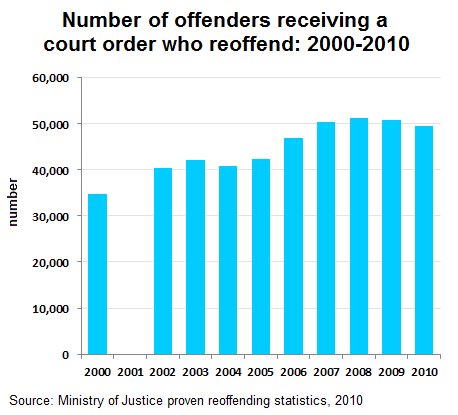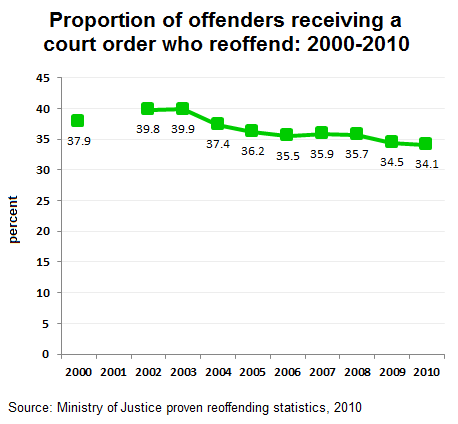Has the probation service failed the public?
"Nearly 50,000 criminals spared jail offend again within a year"
The Daily Mail, 19th December 2012
At a time when the Government is looking to open up new parts of the criminal justice system to private companies, there is an ongoing debate about how successful the public sector has been at rehabilitating criminals.
The source of the Daily Mail's headline figure is the Ministry of Justice (MOJ), which releases quarterly re-offending statistics. The MOJ numbers were also quoted recently in answer to a Parliamentary Question.
The definition of "proven re-offending" is "any offence committed in a one year follow-up period and receiving a court conviction, caution, reprimand or warning".
First off, it's important to note that the Daily Mail is referencing re-offending data from 2010, as these are the most up-to-date numbers available. It's also worth noting that the true level of re-offending is likely to be higher as not all crimes will be detected.
From the MOJ's figures for England and Wales, we can see that there were 49,636 criminals who, having received a court order in 2010, committed another offence within the space of a year. This number constitutes 34.1% of the total number of offenders who received a court order in that year. So, we might refer to 34.1% as the re-offending rate.

In the Daily Mail Conservative MP Priti Patel blamed the probation service for the "shocking" 50,000 statistic: "There is clearly a problem with the probation service which is not working well to deal with this issue".
Is this fair?
If we compare 2010's figures with those from previous years, we can see a trend that the percentage of criminals re-offending has actually decreased slightly since 2000, which would suggest some measure of success on the part of the England and Wales probation service.

The Justice Secretary Chris Grayling and Ms Patel suggest that the best way to reduce reoffending is to offer "payment by results" - in other words, to invite the private sector to the party. While the private sector has assisted with "offender management" since 1992, private companies do not currently provide probation services. Instead, private sector involvement has mostly been confined to operating prisons and transporting offenders.
Harry Fletcher, Assistant General Secretary of the National Association of Probation Officers (Napo), is quoted in the Daily Mail as saying that privatisation "flies in the face of all available evidence".
While the figures in the above graphs do not tell the whole story (the numbers refer only to those offenders who breach a court order, not those who were released from custody and who reoffended), the MOJ's numbers need to be put in context. Rather than the 50,000 statistic representing a high-water mark, we can see that since 2002 there has been a slight but continuous decrease in the proportion of offenders re-offending.
Flickr image courtesy of Vectorportal.com